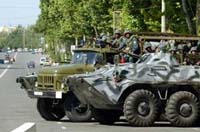USA to impose sanctions against Uzbekistan because of Andijan events
A year after Islam Karimov’s regime suppressed the riot in the town of Andijan, the principal “interested parties” have not changed their attitudes towards the Andijan events. The United States and European Union have taken an extremely negative stand on Karimov while Russia has sided with Tashkent.

Speaking at a press conference in Washington last Friday, official representative of the U.S. Department of State Sean McCormack said that the U.S. might impose sanctions against Uzbekistan due to a refusal of the Uzbek authorities to allow an international investigation into the Andijan tragedy. “The United States is calling again on the Uzbek government to allow a full-scale and open international investigation into the events in Andijan. The United States also exhorts Uzbekistan to stop persecuting civil society and take steps to fulfill its international obligations as to human rights protection,” said McCormack. Earlier last week Senator John McCane (Republican, Ariz.) and Congressman Christopher Smith (Republican, NJ) proposed a bill aimed at imposing sanctions against Uzbekistan. The U.S. lawmakers submitted the bill to Congress as though to mark the first anniversary of Andijan tragedy. If passed by Congress, the bill would ban high-ranking Uzbek officials from entry to the United States, freeze their bank accounts opened with U.S. banks, and put an embargo on weapons and equipment sale to Uzbekistan. Senator McCormack said the U.S. administration was likely to back the bill.
Javier Solana, Secretary General and High Representative for the Common Foreign Policy and Security of the EU, has made a special statement on the occasion of the first anniversary of Andijan events. Solana extended his condolences to the families of the victims. He also took the opportunity to remind Tashkent of its commitments the UN and OSCE. “It is deeply regretful that the Uzbek authorities still refuse to heed the calls of the UE and other organizations to conduct a full investigation of those events,” says Solana’s statement.
Besides, a round-table discussion commemorating the first anniversary of the “Andijan events” was held in European Parliament, in Brussels, on May 11. Muhammad Salikh, head of Erk Democratic Party, one of the Uzbek opposition leaders in exile, took part in the conference. After taking the floor, he leveled his harshest criticism at Karimov. “From now onward the people and opposition of Uzbeskistan are ready and willing to take action to achieve just one goal. In other words, we will be working to liberate Uzbekistan from the totalitarian regime, which has radicalized all the strata of Uzbek population, the regime that is a source of regional conflicts and economic crisis. Here at this conference I represent dreams and wishes of my people. I would like to say that we are ready to begin a new era, an era of democracy,” said Salikh.
Meahwhile, Uzbek President Islam Karimov met with President Putin of Russia in Sochi last Friday. The meeting looks pretty symbolic with the Andijan anniversary and the West’s reaction to it as a backdrop. Yet again, the Kremlin has shown its support for the tough actions of the Uzbek government last May. President Putin said that ratifying the agreement on cooperation between Russia and Uzbekistan last Thursday would uplift bilateral relation to a “new level.”
“There is no doubt that the tragic events in Andijan were instigated by members of the radical Islamic organizations of a terrorist variety. The Uzbek government managed to stabilize the situation after taking fast and effective measures to contain the crisis and liquidate a significant part of the extremists. Developments in Uzbekistan and neighboring states of Central Asia might have taken an entirely different turn if not for the quick response of the Uzbek government,” said Andrei Kokoshin, head of the committee for CIS and relations with compatriots of the State Duma.
The relations between Russia and Uzbekistan keep getting closer. Despite a wave of condemnations of Karimov’s regime in the West, Moscow displays readiness to give its moral support to Tashkent. In the meantime, Uzbekistan seems to be willing to provide more opportunities to Russian companies in the area of privatization of Uzbek enterprises. The situation in Uzbekistan has become yet another controversy on which Russia and the West took completely opposing viewpoints. There is not a chance for the West to improve its relations with Uzbekistan even for pragmatic purposes since Islam Karimov has already earned the reputation of a “bloodthirsty dictator.” Meanwhile, Russia is trying to build its political and economic ties with Karimov’s regime as tight as they can get. Russia is apparently aims to gradually integrate Uzbekistan into the Russian influence zone (Collective Security Treaty Organization, and Organization for Economic Cooperation in Europe and Central Asia ) in the countries of the former Soviet Union.
Politcom
Translated by Guerman Grachev
Pravda.Ru
Discuss this article on Pravda.Ru English Forum
Subscribe to Pravda.Ru Telegram channel, Facebook, RSS!


